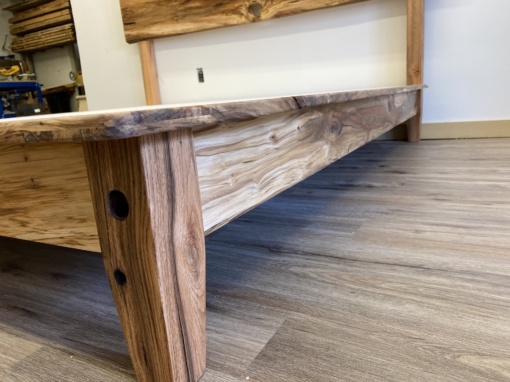 Your goal is to find a contractor who is right for your job and will deliver on time and on budget. Come to interviews with a knowledge of the project, your budget, and time frame if you want them to say yes. |
Anyone who has embarked upon a home improvement project has heard advice on how to select the right contractor. The emphasis is on finding an honest, competent, professional contractor who will be easy to work with and fair in the process. Homeowners routinely pre-qualify contractors by getting as much information as possible during an initial meeting. But with demand for their services at an all-time high, residential contractors are quickly learning how to pre-qualify their prospective customers, as well.
Remodeling Supply and Demand
According to the U.S. Census Bureau’s American Housing Survey, the United States has over 119 million housing units with an average age of over 30 years. This explains why the annual dollar volume of remodeling activity has been rising steadily for the last several years. The Joint Center for Housing Studies at Harvard University shows that Americans spent over $148 billion on home improvements in 2004 alone. This means that it’s a seller’s market when it comes to finding a professional to do the work. As with any hot market, it’s often the homeowners who have to take measures to make themselves appealing to the contractors.
Good Contractors Screen Clients
As the demand for remodeling services has risen, so have the standards of professionalism among remodeling contractors. Building professionals know that homeowners demand great customer service, quality, and value. Contractors also know that in order to provide all that, they need to be efficient and stay profitable. The key to success is finding the clients and the jobs that will work with their timetable, abilities, and schedule. This means selecting the job that can be done well and paid on schedule.
 |
||||||||||||||
|
||||||||||||||
Like homeowners who interview their contractors, the best contractors have a list of questions that they ask all prospective clients. Some contractors even assign point values to each answer and score each prospect. Matt Gazo, a Builder in Burlington, Vermont, was recently named “Remodelor of the Year” by his peers in the Homebuilders and Remodelors Association of Northern Vermont. Here are some of the questions Matt asks prospective clients, and some tips to raise your score:
- How did you hear about us? Remodeling contractors make their money from repeat business. They like to hear referrals from past customers and will score a referral much higher than an ad discovered in the yellow pages. If you are new to an area and don’t have a network of friends or associates, call the local building trade association for a referral and explain your situation to the contractor.
- Do you own your own house? This may sound like a silly question but put yourself in the contractor’s shoes. You would want to know that the person requesting the work on a property is legally and financially responsible.
- What is the general scope of the work? Your answer to this question will give the contractor an idea of how much thought you have put into your project.
- What is your timeframe? A contractor needs to know how realistic your expectations are. If you’re planning a major kitchen remodel in time for Thanksgiving but have waited until October to call… that’s just not realistic. (In fact the contractor who tells you it can be done is probably making a promise he can’t keep!) “We usually have a three month backlog of work,” Gazo says. “Some projects take that long, or longer, to design and organize. But when new clients come to us with smaller projects that are all ready to go, we can sometimes find gaps in our schedule and shorten that waiting period. Flexibility is the key.”
- How will the project be financed? Again, the contractor is looking for signs that you have thought this through. You don’t have to give a lot of detail at this point. Be discrete but honest.
- How much do you expect to invest in this project? In other words, “What is your budget?” Most homeowners will, understandably, guard this information carefully and contractors will expect that. The essence of this question is to show the contractor you have done your research. “We like to know that a prospective customer has at least some awareness of what things cost,” says Gazo. If you don’t provide an answer, the contractor may suggest a price range based on experience.
- Are you getting other bids, and if so, from whom? Contractors expect you to talk to more than one remodeler. But not all contractors are in the same league in terms of quality, service, or price. You’ll raise your score if you have grouped them with companies offering a similar level of quality and service. You should never select a contractor based upon price alone.;
- Have you had experience with other remodeling projects? Many professional contractors would rather work with people who have been through a project or two, even if those projects went sour. It lets them know you understand some of the challenges of remodeling. But be honest; If you’re a “newbie”, the best contractors will patiently guide you through the process.
More Tips on Becoming a Preferred Customer
- Be willing to meet contractors during normal working hours and try to have all decision-makers there. “It’s a real red flag for us if clients insist on meeting at night, on weekends, or if spouses or partners can never attend meetings,” Gazo says.
- Be prepared and organized. “It really helps the process along when the client has taken the time to start a file of notes and pictures clipped from magazines and catalogs. When we find a prospective client who is prepared and informed, we’ll go out of our way to accommodate them!” Gazo says.
Proceed With Confidence
Contractors want to find clients and jobs that will work for them. Just like you, professional contractors are looking for a “good fit.” They understand the value of a good working relationship and they want to earn your repeat business. If the contractor you interview has as many questions for you as you have for him, then you’ve probably found a true professional. And in turn, he or she has found you.
Credit: Renovate Your World




























